Report on Law, Policy and Ethical Practice in Health and Social Care
VerifiedAdded on 2023/01/06
|19
|6374
|78
Report
AI Summary
This report provides a comprehensive overview of the legal, policy, and ethical landscape within health and social care. It examines the roles of legislature, executive, and judiciary in shaping this landscape, detailing key features of legislation, statutory guidance, and codes of practice. The report analyzes ethical considerations, such as informed consent and confidentiality, and their influence on legal and policy frameworks. It evaluates national systems of government, specifically the UK, in relation to effective healthcare practices and practitioners. The relationship between key legislation and national policies is described, along with a comparison of national and organizational policies against professional standards. The report includes reflections on meeting professional standards, an analysis of equality legislation, and the impact of human rights law. It also covers implementation of relevant legislation, analysis of recent health and social legislation, and the relationship between law, policy, and ethics through a case scenario. The impact of relevant law and policy over the outcome of a real case scenario is explained. Finally, the report critically reviews ways in which healthcare practitioners ensure currency and compliance with relevant legislation in relation to ethical practices.
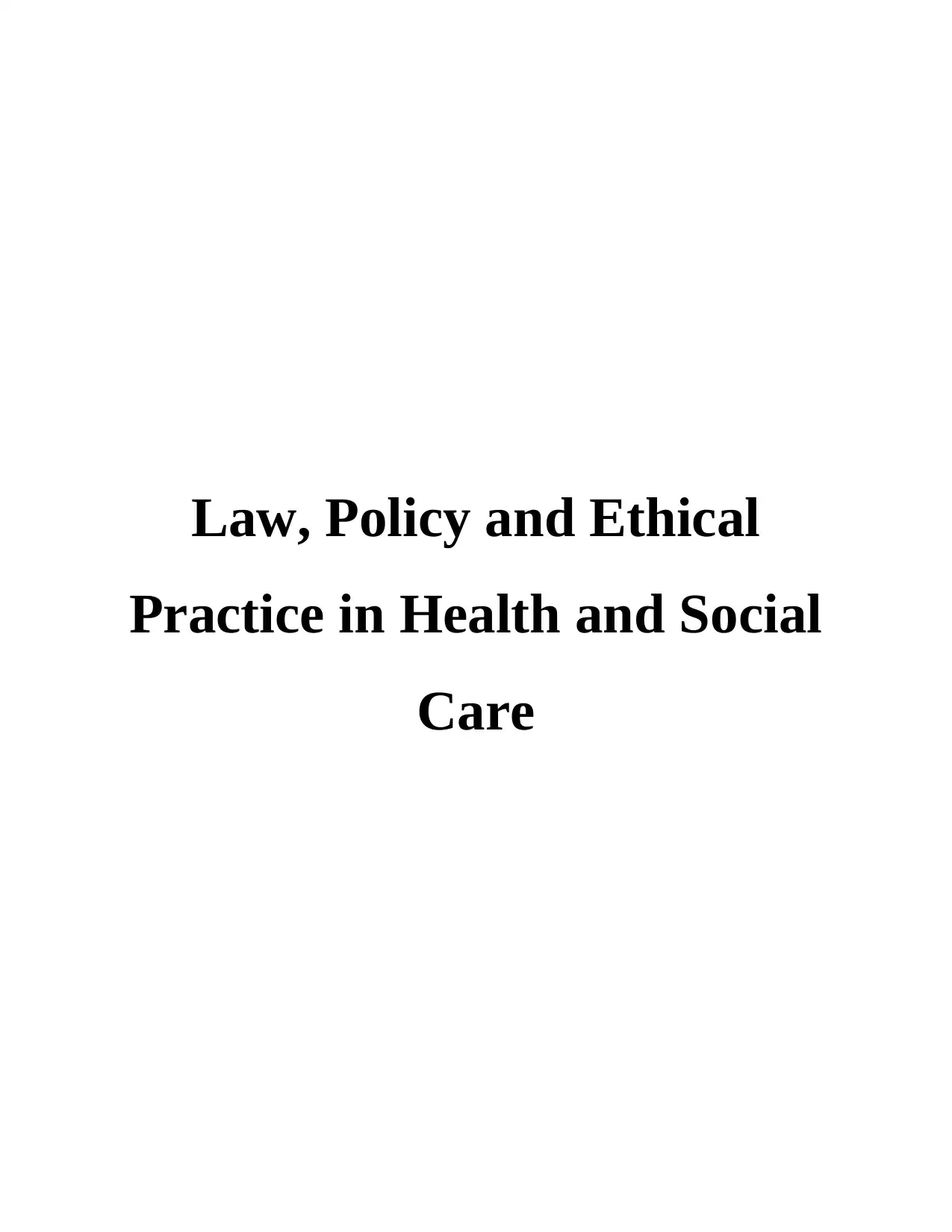
Law, Policy and Ethical
Practice in Health and Social
Care
Practice in Health and Social
Care
Paraphrase This Document
Need a fresh take? Get an instant paraphrase of this document with our AI Paraphraser
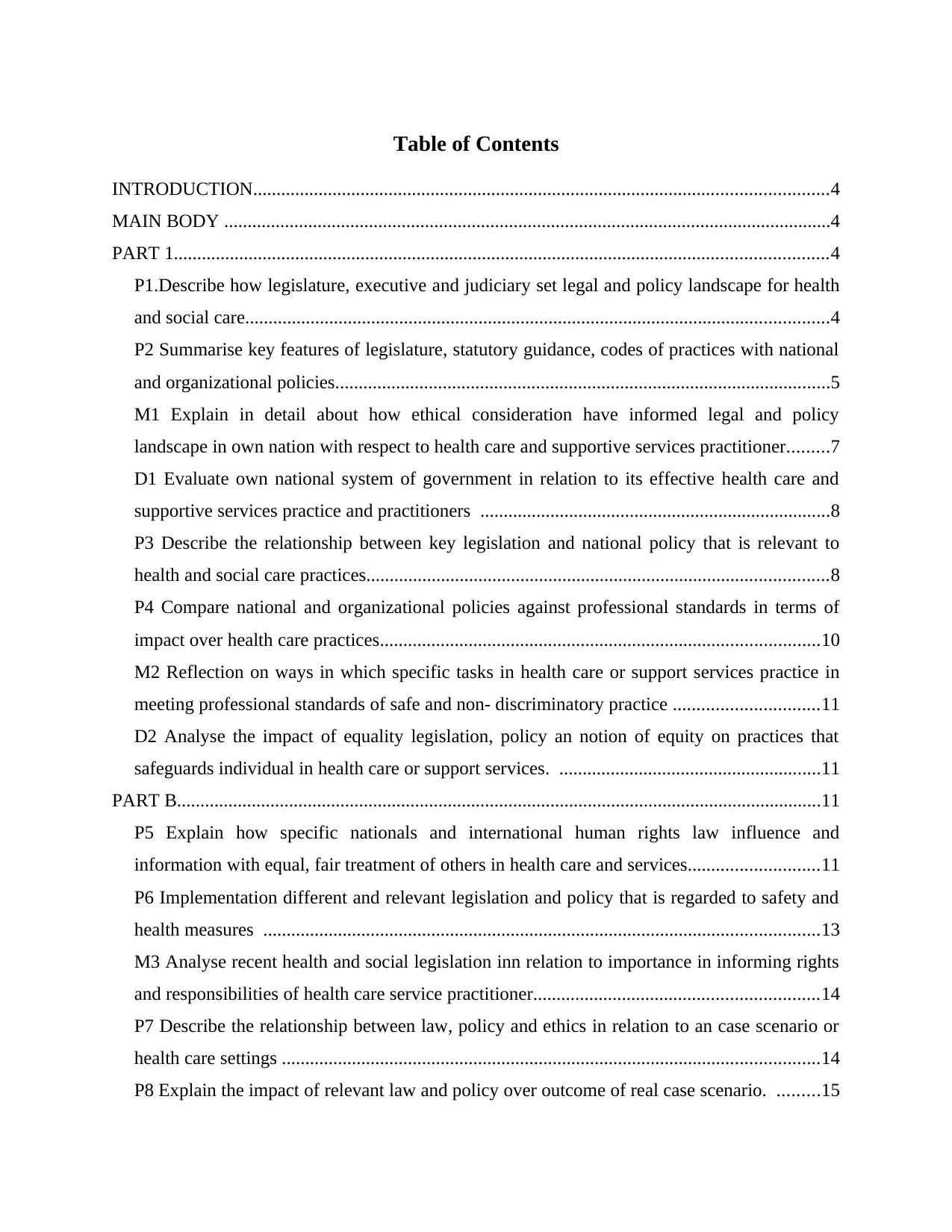
Table of Contents
INTRODUCTION...........................................................................................................................4
MAIN BODY ..................................................................................................................................4
PART 1............................................................................................................................................4
P1.Describe how legislature, executive and judiciary set legal and policy landscape for health
and social care.............................................................................................................................4
P2 Summarise key features of legislature, statutory guidance, codes of practices with national
and organizational policies..........................................................................................................5
M1 Explain in detail about how ethical consideration have informed legal and policy
landscape in own nation with respect to health care and supportive services practitioner.........7
D1 Evaluate own national system of government in relation to its effective health care and
supportive services practice and practitioners ...........................................................................8
P3 Describe the relationship between key legislation and national policy that is relevant to
health and social care practices...................................................................................................8
P4 Compare national and organizational policies against professional standards in terms of
impact over health care practices..............................................................................................10
M2 Reflection on ways in which specific tasks in health care or support services practice in
meeting professional standards of safe and non- discriminatory practice ...............................11
D2 Analyse the impact of equality legislation, policy an notion of equity on practices that
safeguards individual in health care or support services. ........................................................11
PART B..........................................................................................................................................11
P5 Explain how specific nationals and international human rights law influence and
information with equal, fair treatment of others in health care and services............................11
P6 Implementation different and relevant legislation and policy that is regarded to safety and
health measures .......................................................................................................................13
M3 Analyse recent health and social legislation inn relation to importance in informing rights
and responsibilities of health care service practitioner.............................................................14
P7 Describe the relationship between law, policy and ethics in relation to an case scenario or
health care settings ...................................................................................................................14
P8 Explain the impact of relevant law and policy over outcome of real case scenario. .........15
INTRODUCTION...........................................................................................................................4
MAIN BODY ..................................................................................................................................4
PART 1............................................................................................................................................4
P1.Describe how legislature, executive and judiciary set legal and policy landscape for health
and social care.............................................................................................................................4
P2 Summarise key features of legislature, statutory guidance, codes of practices with national
and organizational policies..........................................................................................................5
M1 Explain in detail about how ethical consideration have informed legal and policy
landscape in own nation with respect to health care and supportive services practitioner.........7
D1 Evaluate own national system of government in relation to its effective health care and
supportive services practice and practitioners ...........................................................................8
P3 Describe the relationship between key legislation and national policy that is relevant to
health and social care practices...................................................................................................8
P4 Compare national and organizational policies against professional standards in terms of
impact over health care practices..............................................................................................10
M2 Reflection on ways in which specific tasks in health care or support services practice in
meeting professional standards of safe and non- discriminatory practice ...............................11
D2 Analyse the impact of equality legislation, policy an notion of equity on practices that
safeguards individual in health care or support services. ........................................................11
PART B..........................................................................................................................................11
P5 Explain how specific nationals and international human rights law influence and
information with equal, fair treatment of others in health care and services............................11
P6 Implementation different and relevant legislation and policy that is regarded to safety and
health measures .......................................................................................................................13
M3 Analyse recent health and social legislation inn relation to importance in informing rights
and responsibilities of health care service practitioner.............................................................14
P7 Describe the relationship between law, policy and ethics in relation to an case scenario or
health care settings ...................................................................................................................14
P8 Explain the impact of relevant law and policy over outcome of real case scenario. .........15
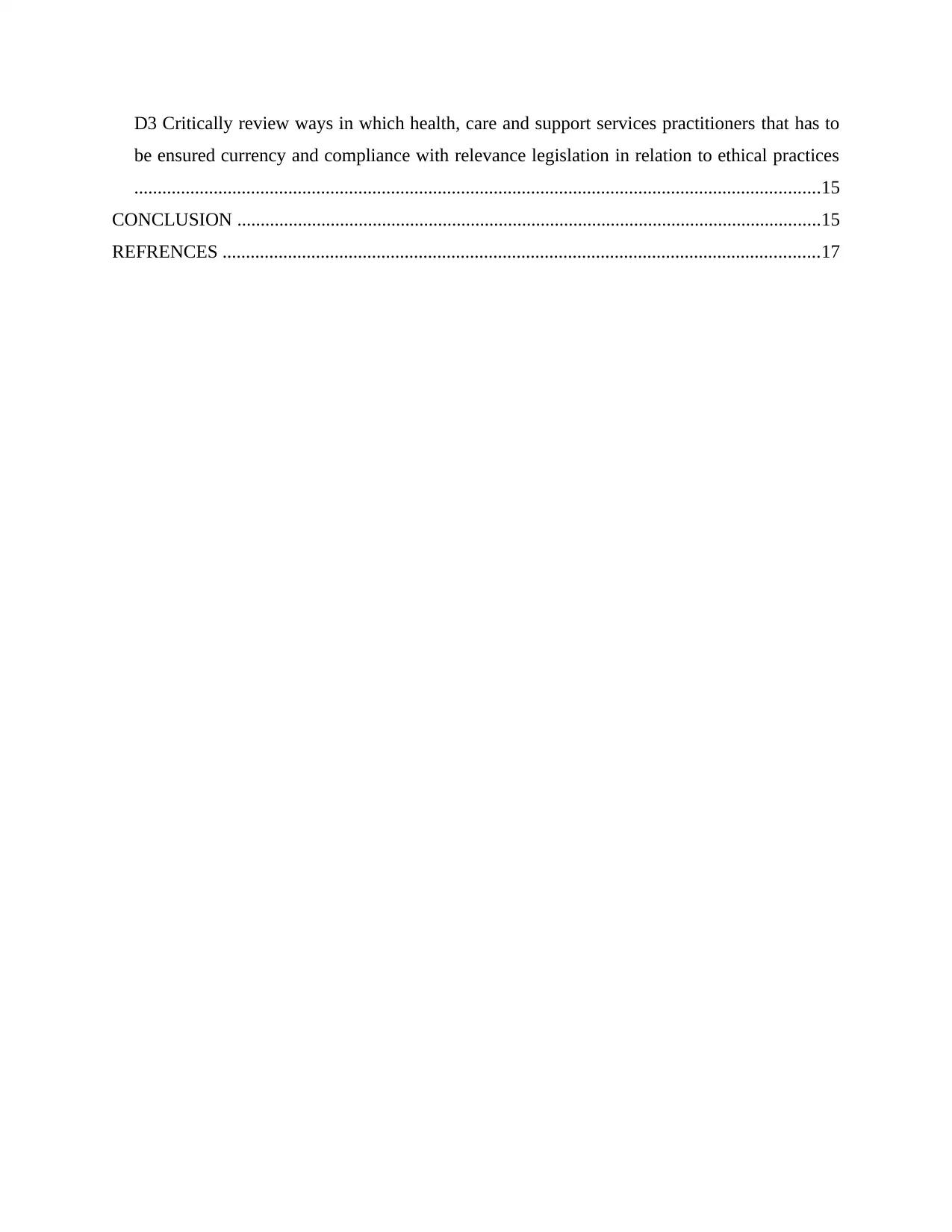
D3 Critically review ways in which health, care and support services practitioners that has to
be ensured currency and compliance with relevance legislation in relation to ethical practices
...................................................................................................................................................15
CONCLUSION .............................................................................................................................15
REFRENCES ................................................................................................................................17
be ensured currency and compliance with relevance legislation in relation to ethical practices
...................................................................................................................................................15
CONCLUSION .............................................................................................................................15
REFRENCES ................................................................................................................................17
⊘ This is a preview!⊘
Do you want full access?
Subscribe today to unlock all pages.

Trusted by 1+ million students worldwide
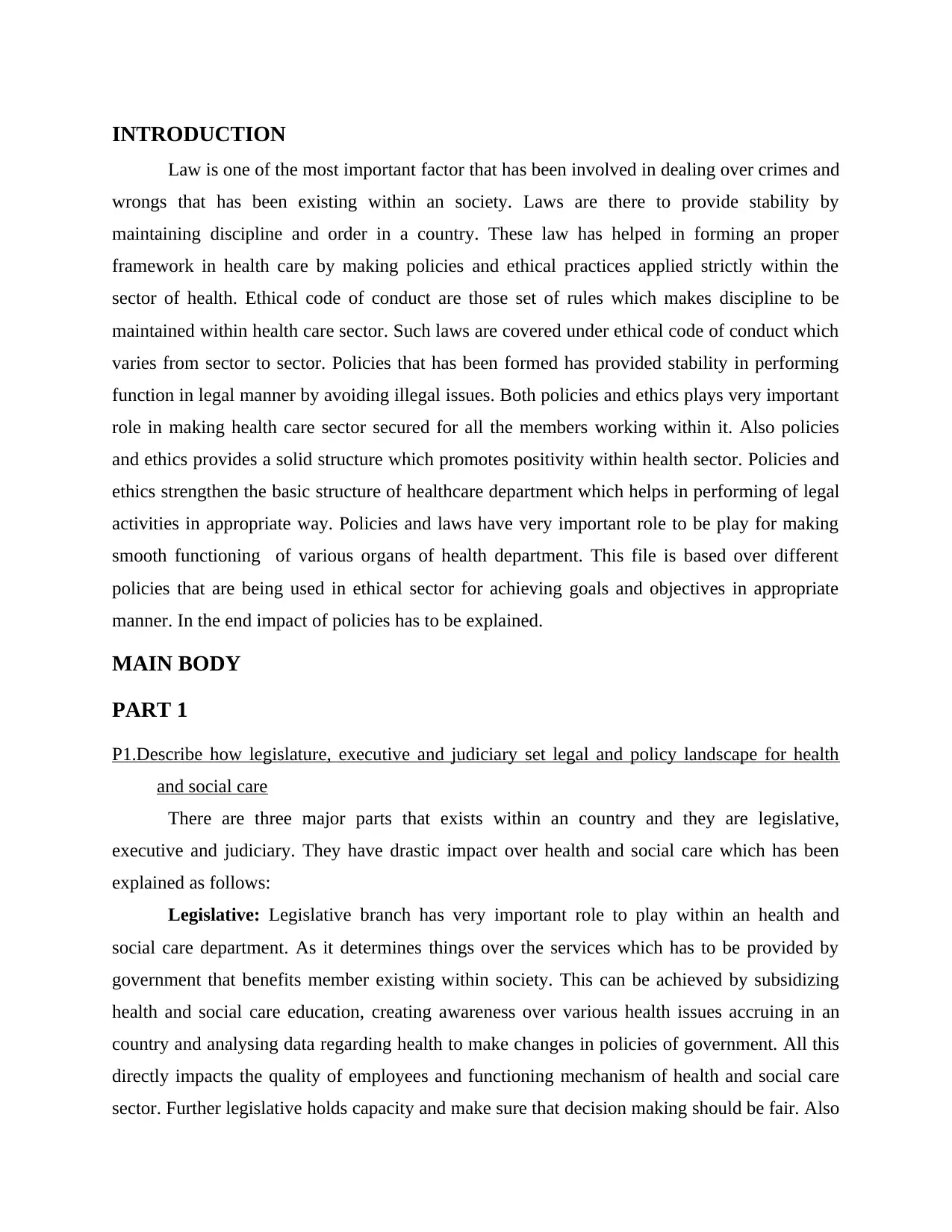
INTRODUCTION
Law is one of the most important factor that has been involved in dealing over crimes and
wrongs that has been existing within an society. Laws are there to provide stability by
maintaining discipline and order in a country. These law has helped in forming an proper
framework in health care by making policies and ethical practices applied strictly within the
sector of health. Ethical code of conduct are those set of rules which makes discipline to be
maintained within health care sector. Such laws are covered under ethical code of conduct which
varies from sector to sector. Policies that has been formed has provided stability in performing
function in legal manner by avoiding illegal issues. Both policies and ethics plays very important
role in making health care sector secured for all the members working within it. Also policies
and ethics provides a solid structure which promotes positivity within health sector. Policies and
ethics strengthen the basic structure of healthcare department which helps in performing of legal
activities in appropriate way. Policies and laws have very important role to be play for making
smooth functioning of various organs of health department. This file is based over different
policies that are being used in ethical sector for achieving goals and objectives in appropriate
manner. In the end impact of policies has to be explained.
MAIN BODY
PART 1
P1.Describe how legislature, executive and judiciary set legal and policy landscape for health
and social care
There are three major parts that exists within an country and they are legislative,
executive and judiciary. They have drastic impact over health and social care which has been
explained as follows:
Legislative: Legislative branch has very important role to play within an health and
social care department. As it determines things over the services which has to be provided by
government that benefits member existing within society. This can be achieved by subsidizing
health and social care education, creating awareness over various health issues accruing in an
country and analysing data regarding health to make changes in policies of government. All this
directly impacts the quality of employees and functioning mechanism of health and social care
sector. Further legislative holds capacity and make sure that decision making should be fair. Also
Law is one of the most important factor that has been involved in dealing over crimes and
wrongs that has been existing within an society. Laws are there to provide stability by
maintaining discipline and order in a country. These law has helped in forming an proper
framework in health care by making policies and ethical practices applied strictly within the
sector of health. Ethical code of conduct are those set of rules which makes discipline to be
maintained within health care sector. Such laws are covered under ethical code of conduct which
varies from sector to sector. Policies that has been formed has provided stability in performing
function in legal manner by avoiding illegal issues. Both policies and ethics plays very important
role in making health care sector secured for all the members working within it. Also policies
and ethics provides a solid structure which promotes positivity within health sector. Policies and
ethics strengthen the basic structure of healthcare department which helps in performing of legal
activities in appropriate way. Policies and laws have very important role to be play for making
smooth functioning of various organs of health department. This file is based over different
policies that are being used in ethical sector for achieving goals and objectives in appropriate
manner. In the end impact of policies has to be explained.
MAIN BODY
PART 1
P1.Describe how legislature, executive and judiciary set legal and policy landscape for health
and social care
There are three major parts that exists within an country and they are legislative,
executive and judiciary. They have drastic impact over health and social care which has been
explained as follows:
Legislative: Legislative branch has very important role to play within an health and
social care department. As it determines things over the services which has to be provided by
government that benefits member existing within society. This can be achieved by subsidizing
health and social care education, creating awareness over various health issues accruing in an
country and analysing data regarding health to make changes in policies of government. All this
directly impacts the quality of employees and functioning mechanism of health and social care
sector. Further legislative holds capacity and make sure that decision making should be fair. Also
Paraphrase This Document
Need a fresh take? Get an instant paraphrase of this document with our AI Paraphraser
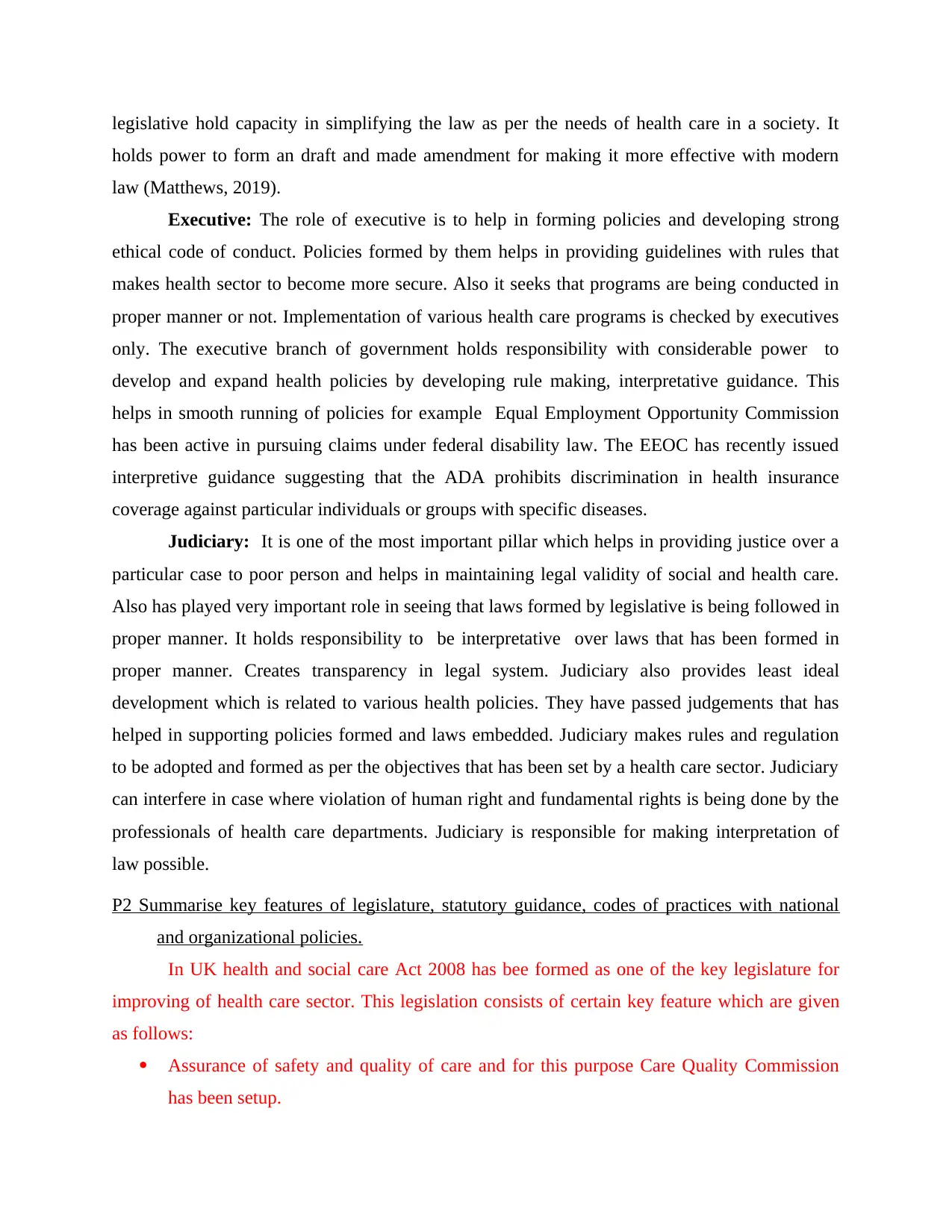
legislative hold capacity in simplifying the law as per the needs of health care in a society. It
holds power to form an draft and made amendment for making it more effective with modern
law (Matthews, 2019).
Executive: The role of executive is to help in forming policies and developing strong
ethical code of conduct. Policies formed by them helps in providing guidelines with rules that
makes health sector to become more secure. Also it seeks that programs are being conducted in
proper manner or not. Implementation of various health care programs is checked by executives
only. The executive branch of government holds responsibility with considerable power to
develop and expand health policies by developing rule making, interpretative guidance. This
helps in smooth running of policies for example Equal Employment Opportunity Commission
has been active in pursuing claims under federal disability law. The EEOC has recently issued
interpretive guidance suggesting that the ADA prohibits discrimination in health insurance
coverage against particular individuals or groups with specific diseases.
Judiciary: It is one of the most important pillar which helps in providing justice over a
particular case to poor person and helps in maintaining legal validity of social and health care.
Also has played very important role in seeing that laws formed by legislative is being followed in
proper manner. It holds responsibility to be interpretative over laws that has been formed in
proper manner. Creates transparency in legal system. Judiciary also provides least ideal
development which is related to various health policies. They have passed judgements that has
helped in supporting policies formed and laws embedded. Judiciary makes rules and regulation
to be adopted and formed as per the objectives that has been set by a health care sector. Judiciary
can interfere in case where violation of human right and fundamental rights is being done by the
professionals of health care departments. Judiciary is responsible for making interpretation of
law possible.
P2 Summarise key features of legislature, statutory guidance, codes of practices with national
and organizational policies.
In UK health and social care Act 2008 has bee formed as one of the key legislature for
improving of health care sector. This legislation consists of certain key feature which are given
as follows:
Assurance of safety and quality of care and for this purpose Care Quality Commission
has been setup.
holds power to form an draft and made amendment for making it more effective with modern
law (Matthews, 2019).
Executive: The role of executive is to help in forming policies and developing strong
ethical code of conduct. Policies formed by them helps in providing guidelines with rules that
makes health sector to become more secure. Also it seeks that programs are being conducted in
proper manner or not. Implementation of various health care programs is checked by executives
only. The executive branch of government holds responsibility with considerable power to
develop and expand health policies by developing rule making, interpretative guidance. This
helps in smooth running of policies for example Equal Employment Opportunity Commission
has been active in pursuing claims under federal disability law. The EEOC has recently issued
interpretive guidance suggesting that the ADA prohibits discrimination in health insurance
coverage against particular individuals or groups with specific diseases.
Judiciary: It is one of the most important pillar which helps in providing justice over a
particular case to poor person and helps in maintaining legal validity of social and health care.
Also has played very important role in seeing that laws formed by legislative is being followed in
proper manner. It holds responsibility to be interpretative over laws that has been formed in
proper manner. Creates transparency in legal system. Judiciary also provides least ideal
development which is related to various health policies. They have passed judgements that has
helped in supporting policies formed and laws embedded. Judiciary makes rules and regulation
to be adopted and formed as per the objectives that has been set by a health care sector. Judiciary
can interfere in case where violation of human right and fundamental rights is being done by the
professionals of health care departments. Judiciary is responsible for making interpretation of
law possible.
P2 Summarise key features of legislature, statutory guidance, codes of practices with national
and organizational policies.
In UK health and social care Act 2008 has bee formed as one of the key legislature for
improving of health care sector. This legislation consists of certain key feature which are given
as follows:
Assurance of safety and quality of care and for this purpose Care Quality Commission
has been setup.
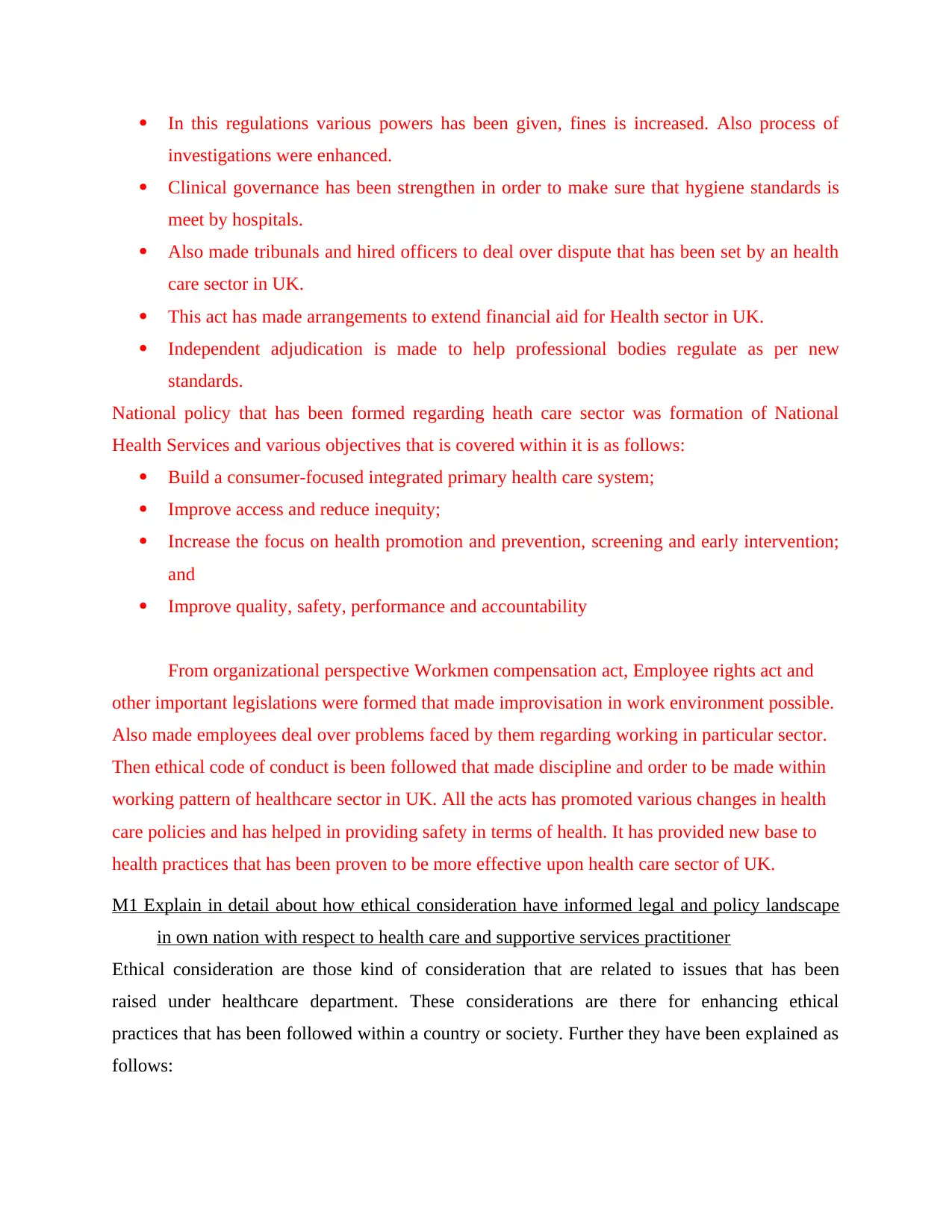
In this regulations various powers has been given, fines is increased. Also process of
investigations were enhanced.
Clinical governance has been strengthen in order to make sure that hygiene standards is
meet by hospitals.
Also made tribunals and hired officers to deal over dispute that has been set by an health
care sector in UK.
This act has made arrangements to extend financial aid for Health sector in UK.
Independent adjudication is made to help professional bodies regulate as per new
standards.
National policy that has been formed regarding heath care sector was formation of National
Health Services and various objectives that is covered within it is as follows:
Build a consumer-focused integrated primary health care system;
Improve access and reduce inequity;
Increase the focus on health promotion and prevention, screening and early intervention;
and
Improve quality, safety, performance and accountability
From organizational perspective Workmen compensation act, Employee rights act and
other important legislations were formed that made improvisation in work environment possible.
Also made employees deal over problems faced by them regarding working in particular sector.
Then ethical code of conduct is been followed that made discipline and order to be made within
working pattern of healthcare sector in UK. All the acts has promoted various changes in health
care policies and has helped in providing safety in terms of health. It has provided new base to
health practices that has been proven to be more effective upon health care sector of UK.
M1 Explain in detail about how ethical consideration have informed legal and policy landscape
in own nation with respect to health care and supportive services practitioner
Ethical consideration are those kind of consideration that are related to issues that has been
raised under healthcare department. These considerations are there for enhancing ethical
practices that has been followed within a country or society. Further they have been explained as
follows:
investigations were enhanced.
Clinical governance has been strengthen in order to make sure that hygiene standards is
meet by hospitals.
Also made tribunals and hired officers to deal over dispute that has been set by an health
care sector in UK.
This act has made arrangements to extend financial aid for Health sector in UK.
Independent adjudication is made to help professional bodies regulate as per new
standards.
National policy that has been formed regarding heath care sector was formation of National
Health Services and various objectives that is covered within it is as follows:
Build a consumer-focused integrated primary health care system;
Improve access and reduce inequity;
Increase the focus on health promotion and prevention, screening and early intervention;
and
Improve quality, safety, performance and accountability
From organizational perspective Workmen compensation act, Employee rights act and
other important legislations were formed that made improvisation in work environment possible.
Also made employees deal over problems faced by them regarding working in particular sector.
Then ethical code of conduct is been followed that made discipline and order to be made within
working pattern of healthcare sector in UK. All the acts has promoted various changes in health
care policies and has helped in providing safety in terms of health. It has provided new base to
health practices that has been proven to be more effective upon health care sector of UK.
M1 Explain in detail about how ethical consideration have informed legal and policy landscape
in own nation with respect to health care and supportive services practitioner
Ethical consideration are those kind of consideration that are related to issues that has been
raised under healthcare department. These considerations are there for enhancing ethical
practices that has been followed within a country or society. Further they have been explained as
follows:
⊘ This is a preview!⊘
Do you want full access?
Subscribe today to unlock all pages.

Trusted by 1+ million students worldwide
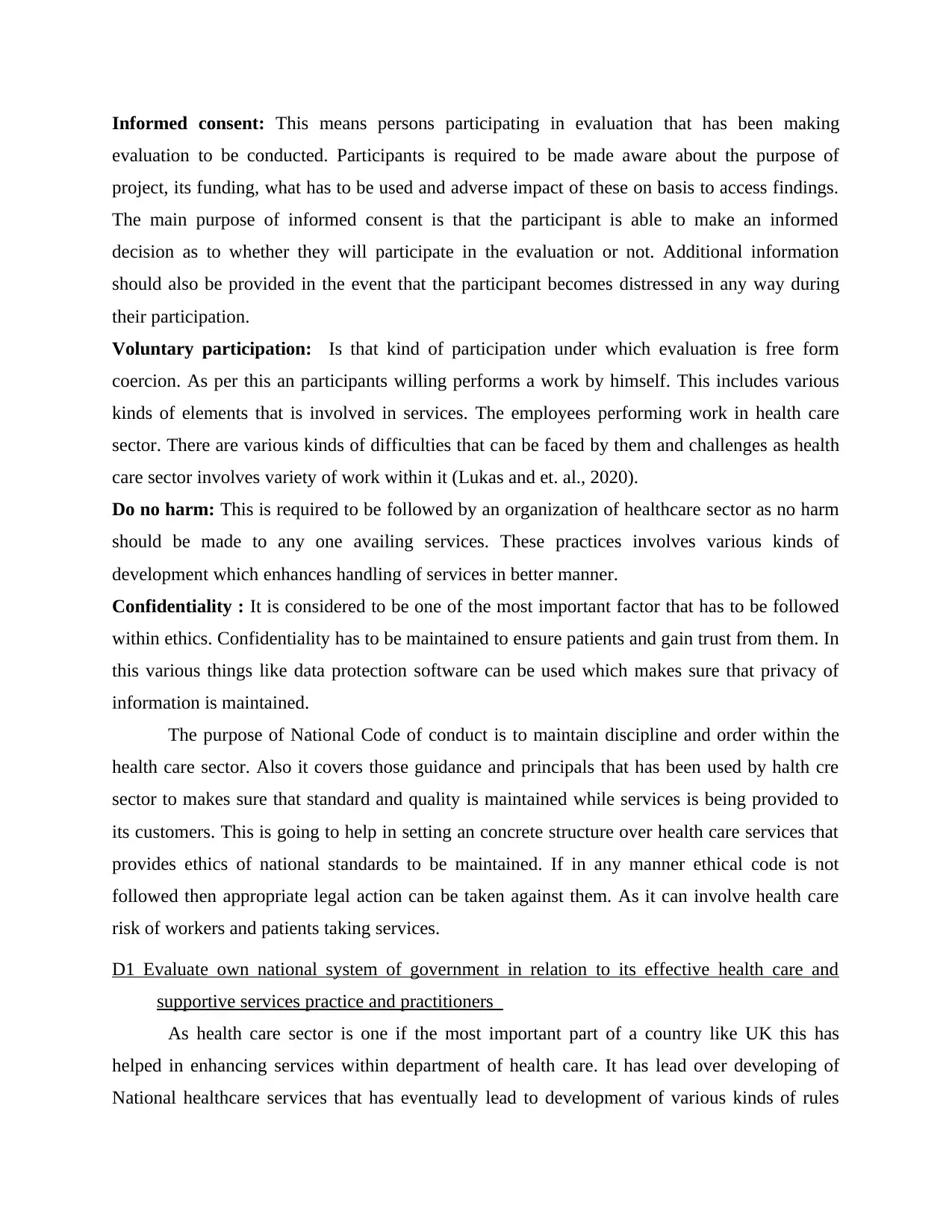
Informed consent: This means persons participating in evaluation that has been making
evaluation to be conducted. Participants is required to be made aware about the purpose of
project, its funding, what has to be used and adverse impact of these on basis to access findings.
The main purpose of informed consent is that the participant is able to make an informed
decision as to whether they will participate in the evaluation or not. Additional information
should also be provided in the event that the participant becomes distressed in any way during
their participation.
Voluntary participation: Is that kind of participation under which evaluation is free form
coercion. As per this an participants willing performs a work by himself. This includes various
kinds of elements that is involved in services. The employees performing work in health care
sector. There are various kinds of difficulties that can be faced by them and challenges as health
care sector involves variety of work within it (Lukas and et. al., 2020).
Do no harm: This is required to be followed by an organization of healthcare sector as no harm
should be made to any one availing services. These practices involves various kinds of
development which enhances handling of services in better manner.
Confidentiality : It is considered to be one of the most important factor that has to be followed
within ethics. Confidentiality has to be maintained to ensure patients and gain trust from them. In
this various things like data protection software can be used which makes sure that privacy of
information is maintained.
The purpose of National Code of conduct is to maintain discipline and order within the
health care sector. Also it covers those guidance and principals that has been used by halth cre
sector to makes sure that standard and quality is maintained while services is being provided to
its customers. This is going to help in setting an concrete structure over health care services that
provides ethics of national standards to be maintained. If in any manner ethical code is not
followed then appropriate legal action can be taken against them. As it can involve health care
risk of workers and patients taking services.
D1 Evaluate own national system of government in relation to its effective health care and
supportive services practice and practitioners
As health care sector is one if the most important part of a country like UK this has
helped in enhancing services within department of health care. It has lead over developing of
National healthcare services that has eventually lead to development of various kinds of rules
evaluation to be conducted. Participants is required to be made aware about the purpose of
project, its funding, what has to be used and adverse impact of these on basis to access findings.
The main purpose of informed consent is that the participant is able to make an informed
decision as to whether they will participate in the evaluation or not. Additional information
should also be provided in the event that the participant becomes distressed in any way during
their participation.
Voluntary participation: Is that kind of participation under which evaluation is free form
coercion. As per this an participants willing performs a work by himself. This includes various
kinds of elements that is involved in services. The employees performing work in health care
sector. There are various kinds of difficulties that can be faced by them and challenges as health
care sector involves variety of work within it (Lukas and et. al., 2020).
Do no harm: This is required to be followed by an organization of healthcare sector as no harm
should be made to any one availing services. These practices involves various kinds of
development which enhances handling of services in better manner.
Confidentiality : It is considered to be one of the most important factor that has to be followed
within ethics. Confidentiality has to be maintained to ensure patients and gain trust from them. In
this various things like data protection software can be used which makes sure that privacy of
information is maintained.
The purpose of National Code of conduct is to maintain discipline and order within the
health care sector. Also it covers those guidance and principals that has been used by halth cre
sector to makes sure that standard and quality is maintained while services is being provided to
its customers. This is going to help in setting an concrete structure over health care services that
provides ethics of national standards to be maintained. If in any manner ethical code is not
followed then appropriate legal action can be taken against them. As it can involve health care
risk of workers and patients taking services.
D1 Evaluate own national system of government in relation to its effective health care and
supportive services practice and practitioners
As health care sector is one if the most important part of a country like UK this has
helped in enhancing services within department of health care. It has lead over developing of
National healthcare services that has eventually lead to development of various kinds of rules
Paraphrase This Document
Need a fresh take? Get an instant paraphrase of this document with our AI Paraphraser
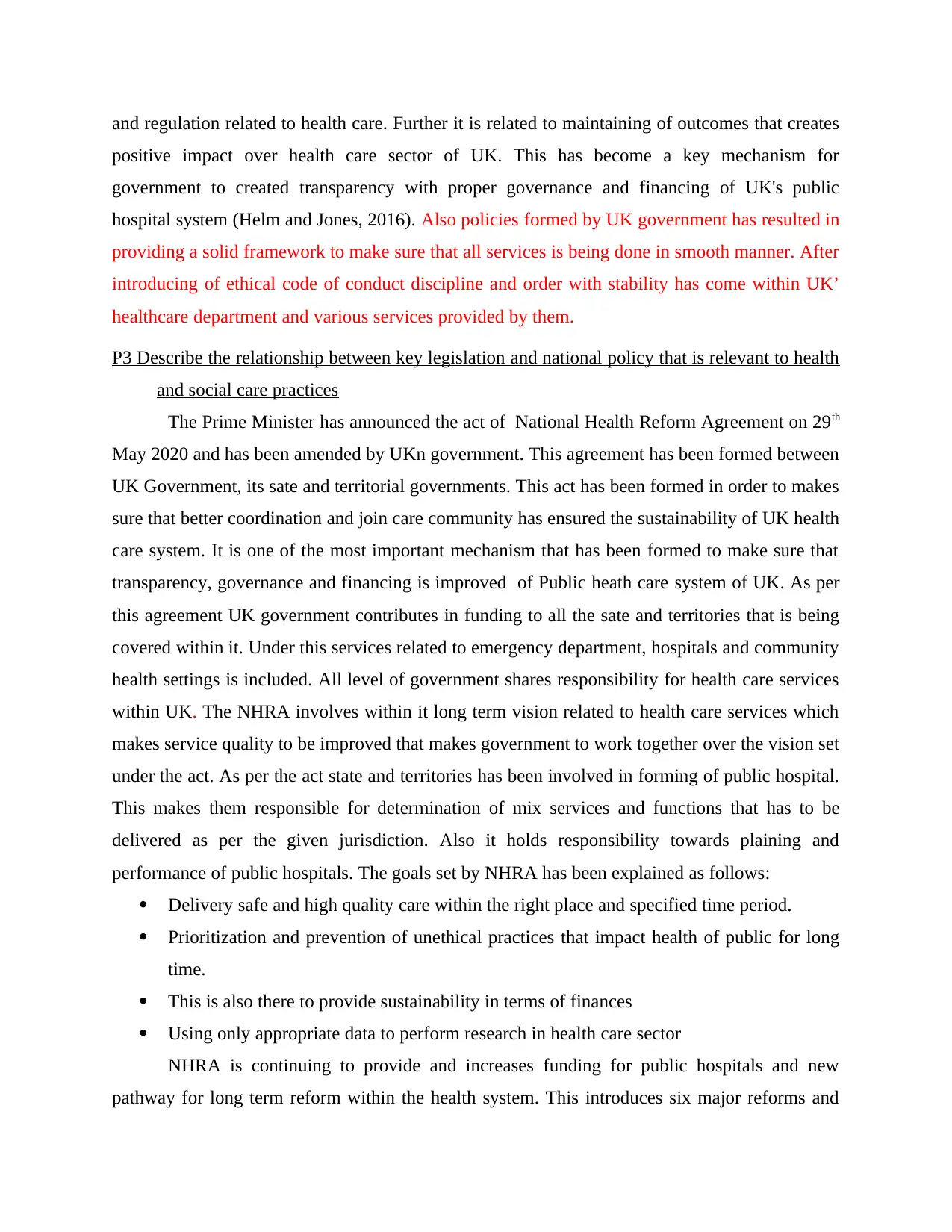
and regulation related to health care. Further it is related to maintaining of outcomes that creates
positive impact over health care sector of UK. This has become a key mechanism for
government to created transparency with proper governance and financing of UK's public
hospital system (Helm and Jones, 2016). Also policies formed by UK government has resulted in
providing a solid framework to make sure that all services is being done in smooth manner. After
introducing of ethical code of conduct discipline and order with stability has come within UK’
healthcare department and various services provided by them.
P3 Describe the relationship between key legislation and national policy that is relevant to health
and social care practices
The Prime Minister has announced the act of National Health Reform Agreement on 29th
May 2020 and has been amended by UKn government. This agreement has been formed between
UK Government, its sate and territorial governments. This act has been formed in order to makes
sure that better coordination and join care community has ensured the sustainability of UK health
care system. It is one of the most important mechanism that has been formed to make sure that
transparency, governance and financing is improved of Public heath care system of UK. As per
this agreement UK government contributes in funding to all the sate and territories that is being
covered within it. Under this services related to emergency department, hospitals and community
health settings is included. All level of government shares responsibility for health care services
within UK. The NHRA involves within it long term vision related to health care services which
makes service quality to be improved that makes government to work together over the vision set
under the act. As per the act state and territories has been involved in forming of public hospital.
This makes them responsible for determination of mix services and functions that has to be
delivered as per the given jurisdiction. Also it holds responsibility towards plaining and
performance of public hospitals. The goals set by NHRA has been explained as follows:
Delivery safe and high quality care within the right place and specified time period.
Prioritization and prevention of unethical practices that impact health of public for long
time.
This is also there to provide sustainability in terms of finances
Using only appropriate data to perform research in health care sector
NHRA is continuing to provide and increases funding for public hospitals and new
pathway for long term reform within the health system. This introduces six major reforms and
positive impact over health care sector of UK. This has become a key mechanism for
government to created transparency with proper governance and financing of UK's public
hospital system (Helm and Jones, 2016). Also policies formed by UK government has resulted in
providing a solid framework to make sure that all services is being done in smooth manner. After
introducing of ethical code of conduct discipline and order with stability has come within UK’
healthcare department and various services provided by them.
P3 Describe the relationship between key legislation and national policy that is relevant to health
and social care practices
The Prime Minister has announced the act of National Health Reform Agreement on 29th
May 2020 and has been amended by UKn government. This agreement has been formed between
UK Government, its sate and territorial governments. This act has been formed in order to makes
sure that better coordination and join care community has ensured the sustainability of UK health
care system. It is one of the most important mechanism that has been formed to make sure that
transparency, governance and financing is improved of Public heath care system of UK. As per
this agreement UK government contributes in funding to all the sate and territories that is being
covered within it. Under this services related to emergency department, hospitals and community
health settings is included. All level of government shares responsibility for health care services
within UK. The NHRA involves within it long term vision related to health care services which
makes service quality to be improved that makes government to work together over the vision set
under the act. As per the act state and territories has been involved in forming of public hospital.
This makes them responsible for determination of mix services and functions that has to be
delivered as per the given jurisdiction. Also it holds responsibility towards plaining and
performance of public hospitals. The goals set by NHRA has been explained as follows:
Delivery safe and high quality care within the right place and specified time period.
Prioritization and prevention of unethical practices that impact health of public for long
time.
This is also there to provide sustainability in terms of finances
Using only appropriate data to perform research in health care sector
NHRA is continuing to provide and increases funding for public hospitals and new
pathway for long term reform within the health system. This introduces six major reforms and
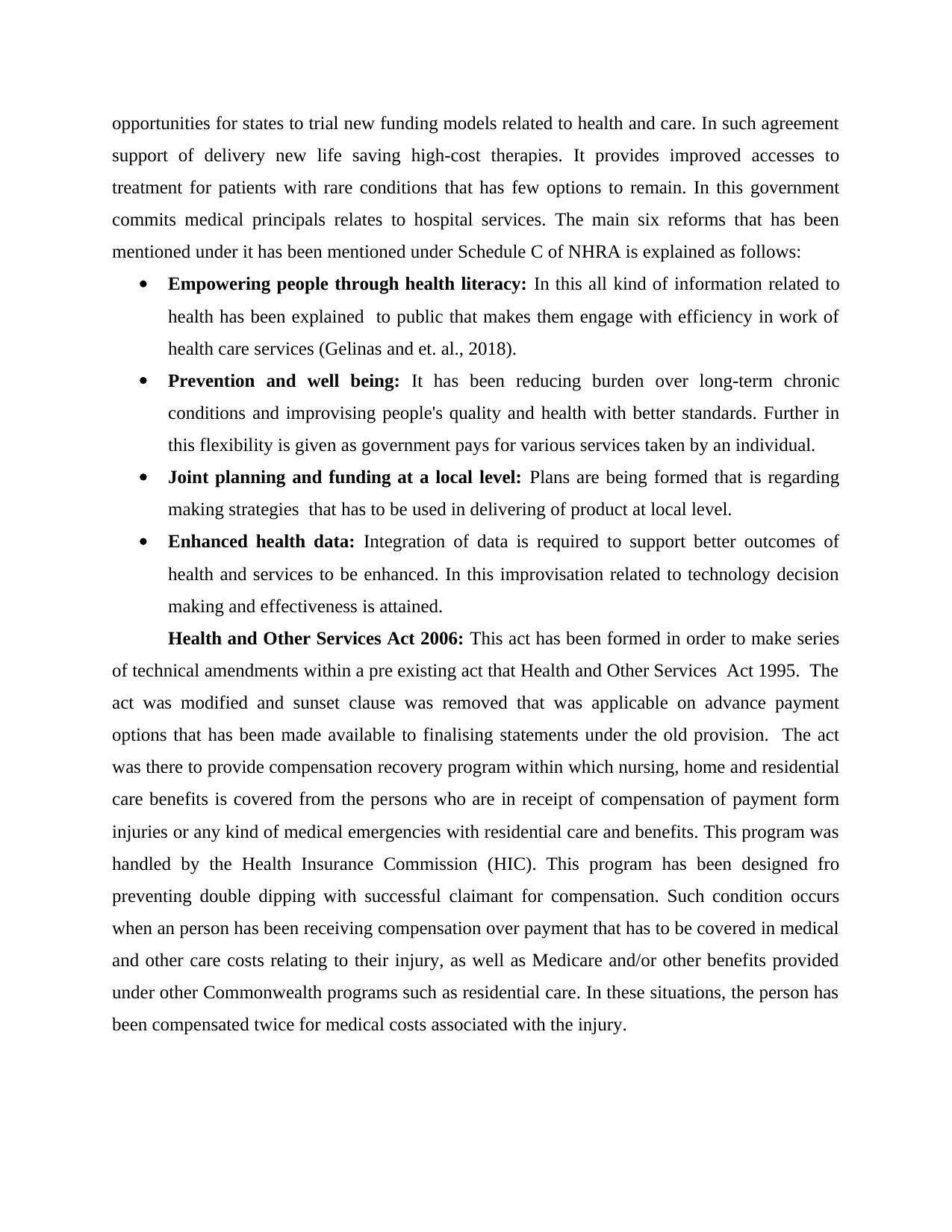
opportunities for states to trial new funding models related to health and care. In such agreement
support of delivery new life saving high-cost therapies. It provides improved accesses to
treatment for patients with rare conditions that has few options to remain. In this government
commits medical principals relates to hospital services. The main six reforms that has been
mentioned under it has been mentioned under Schedule C of NHRA is explained as follows:
Empowering people through health literacy: In this all kind of information related to
health has been explained to public that makes them engage with efficiency in work of
health care services (Gelinas and et. al., 2018).
Prevention and well being: It has been reducing burden over long-term chronic
conditions and improvising people's quality and health with better standards. Further in
this flexibility is given as government pays for various services taken by an individual.
Joint planning and funding at a local level: Plans are being formed that is regarding
making strategies that has to be used in delivering of product at local level.
Enhanced health data: Integration of data is required to support better outcomes of
health and services to be enhanced. In this improvisation related to technology decision
making and effectiveness is attained.
Health and Other Services Act 2006: This act has been formed in order to make series
of technical amendments within a pre existing act that Health and Other Services Act 1995. The
act was modified and sunset clause was removed that was applicable on advance payment
options that has been made available to finalising statements under the old provision. The act
was there to provide compensation recovery program within which nursing, home and residential
care benefits is covered from the persons who are in receipt of compensation of payment form
injuries or any kind of medical emergencies with residential care and benefits. This program was
handled by the Health Insurance Commission (HIC). This program has been designed fro
preventing double dipping with successful claimant for compensation. Such condition occurs
when an person has been receiving compensation over payment that has to be covered in medical
and other care costs relating to their injury, as well as Medicare and/or other benefits provided
under other Commonwealth programs such as residential care. In these situations, the person has
been compensated twice for medical costs associated with the injury.
support of delivery new life saving high-cost therapies. It provides improved accesses to
treatment for patients with rare conditions that has few options to remain. In this government
commits medical principals relates to hospital services. The main six reforms that has been
mentioned under it has been mentioned under Schedule C of NHRA is explained as follows:
Empowering people through health literacy: In this all kind of information related to
health has been explained to public that makes them engage with efficiency in work of
health care services (Gelinas and et. al., 2018).
Prevention and well being: It has been reducing burden over long-term chronic
conditions and improvising people's quality and health with better standards. Further in
this flexibility is given as government pays for various services taken by an individual.
Joint planning and funding at a local level: Plans are being formed that is regarding
making strategies that has to be used in delivering of product at local level.
Enhanced health data: Integration of data is required to support better outcomes of
health and services to be enhanced. In this improvisation related to technology decision
making and effectiveness is attained.
Health and Other Services Act 2006: This act has been formed in order to make series
of technical amendments within a pre existing act that Health and Other Services Act 1995. The
act was modified and sunset clause was removed that was applicable on advance payment
options that has been made available to finalising statements under the old provision. The act
was there to provide compensation recovery program within which nursing, home and residential
care benefits is covered from the persons who are in receipt of compensation of payment form
injuries or any kind of medical emergencies with residential care and benefits. This program was
handled by the Health Insurance Commission (HIC). This program has been designed fro
preventing double dipping with successful claimant for compensation. Such condition occurs
when an person has been receiving compensation over payment that has to be covered in medical
and other care costs relating to their injury, as well as Medicare and/or other benefits provided
under other Commonwealth programs such as residential care. In these situations, the person has
been compensated twice for medical costs associated with the injury.
⊘ This is a preview!⊘
Do you want full access?
Subscribe today to unlock all pages.

Trusted by 1+ million students worldwide
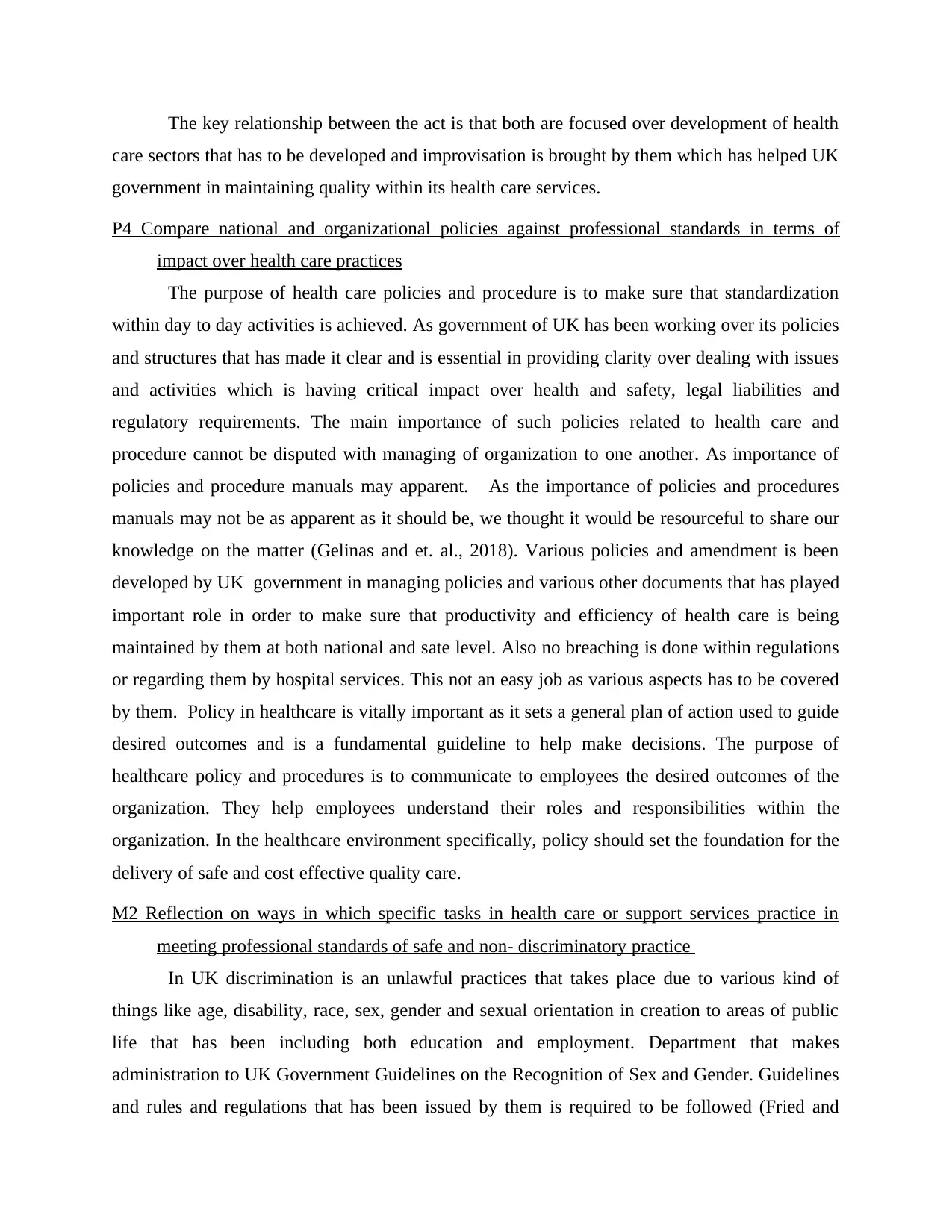
The key relationship between the act is that both are focused over development of health
care sectors that has to be developed and improvisation is brought by them which has helped UK
government in maintaining quality within its health care services.
P4 Compare national and organizational policies against professional standards in terms of
impact over health care practices
The purpose of health care policies and procedure is to make sure that standardization
within day to day activities is achieved. As government of UK has been working over its policies
and structures that has made it clear and is essential in providing clarity over dealing with issues
and activities which is having critical impact over health and safety, legal liabilities and
regulatory requirements. The main importance of such policies related to health care and
procedure cannot be disputed with managing of organization to one another. As importance of
policies and procedure manuals may apparent. As the importance of policies and procedures
manuals may not be as apparent as it should be, we thought it would be resourceful to share our
knowledge on the matter (Gelinas and et. al., 2018). Various policies and amendment is been
developed by UK government in managing policies and various other documents that has played
important role in order to make sure that productivity and efficiency of health care is being
maintained by them at both national and sate level. Also no breaching is done within regulations
or regarding them by hospital services. This not an easy job as various aspects has to be covered
by them. Policy in healthcare is vitally important as it sets a general plan of action used to guide
desired outcomes and is a fundamental guideline to help make decisions. The purpose of
healthcare policy and procedures is to communicate to employees the desired outcomes of the
organization. They help employees understand their roles and responsibilities within the
organization. In the healthcare environment specifically, policy should set the foundation for the
delivery of safe and cost effective quality care.
M2 Reflection on ways in which specific tasks in health care or support services practice in
meeting professional standards of safe and non- discriminatory practice
In UK discrimination is an unlawful practices that takes place due to various kind of
things like age, disability, race, sex, gender and sexual orientation in creation to areas of public
life that has been including both education and employment. Department that makes
administration to UK Government Guidelines on the Recognition of Sex and Gender. Guidelines
and rules and regulations that has been issued by them is required to be followed (Fried and
care sectors that has to be developed and improvisation is brought by them which has helped UK
government in maintaining quality within its health care services.
P4 Compare national and organizational policies against professional standards in terms of
impact over health care practices
The purpose of health care policies and procedure is to make sure that standardization
within day to day activities is achieved. As government of UK has been working over its policies
and structures that has made it clear and is essential in providing clarity over dealing with issues
and activities which is having critical impact over health and safety, legal liabilities and
regulatory requirements. The main importance of such policies related to health care and
procedure cannot be disputed with managing of organization to one another. As importance of
policies and procedure manuals may apparent. As the importance of policies and procedures
manuals may not be as apparent as it should be, we thought it would be resourceful to share our
knowledge on the matter (Gelinas and et. al., 2018). Various policies and amendment is been
developed by UK government in managing policies and various other documents that has played
important role in order to make sure that productivity and efficiency of health care is being
maintained by them at both national and sate level. Also no breaching is done within regulations
or regarding them by hospital services. This not an easy job as various aspects has to be covered
by them. Policy in healthcare is vitally important as it sets a general plan of action used to guide
desired outcomes and is a fundamental guideline to help make decisions. The purpose of
healthcare policy and procedures is to communicate to employees the desired outcomes of the
organization. They help employees understand their roles and responsibilities within the
organization. In the healthcare environment specifically, policy should set the foundation for the
delivery of safe and cost effective quality care.
M2 Reflection on ways in which specific tasks in health care or support services practice in
meeting professional standards of safe and non- discriminatory practice
In UK discrimination is an unlawful practices that takes place due to various kind of
things like age, disability, race, sex, gender and sexual orientation in creation to areas of public
life that has been including both education and employment. Department that makes
administration to UK Government Guidelines on the Recognition of Sex and Gender. Guidelines
and rules and regulations that has been issued by them is required to be followed (Fried and
Paraphrase This Document
Need a fresh take? Get an instant paraphrase of this document with our AI Paraphraser
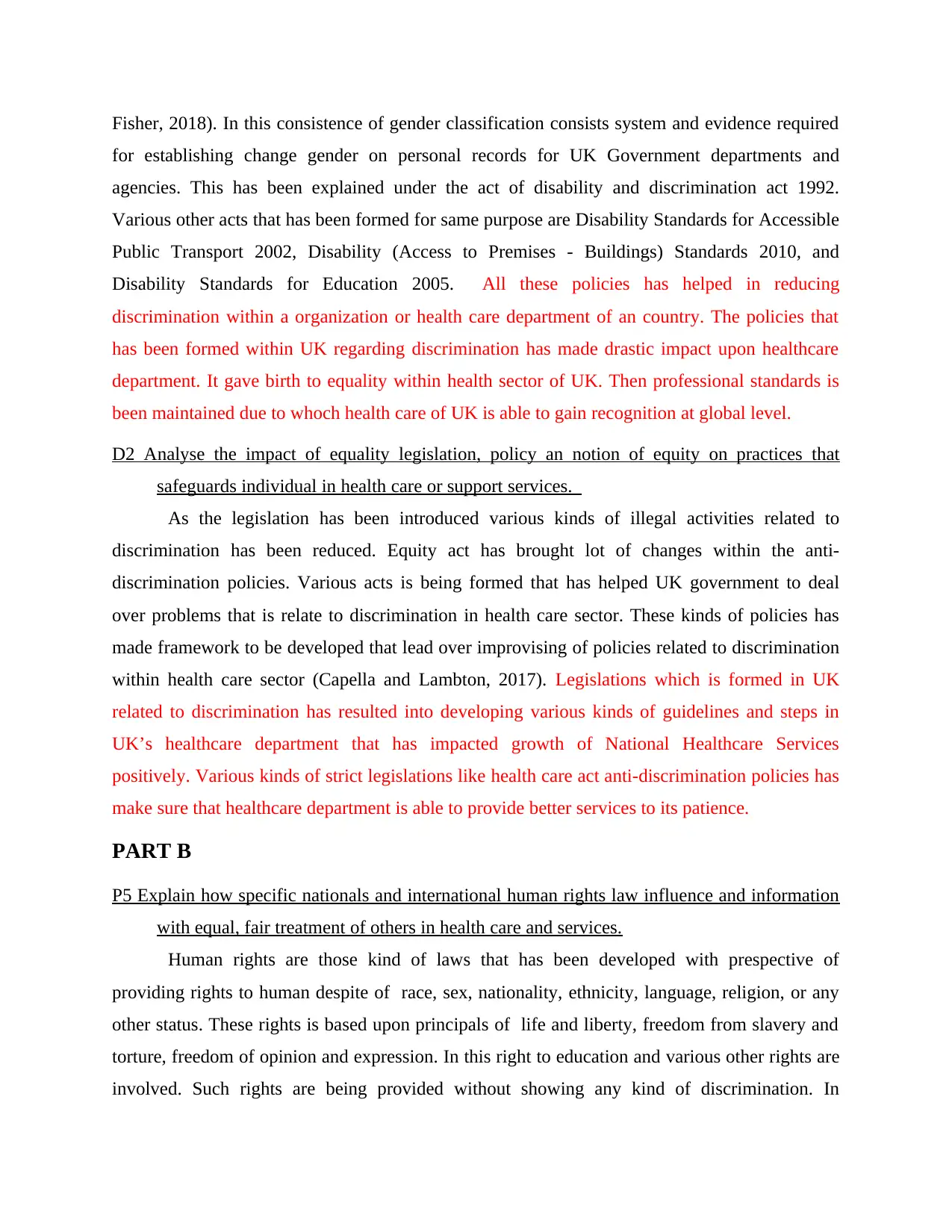
Fisher, 2018). In this consistence of gender classification consists system and evidence required
for establishing change gender on personal records for UK Government departments and
agencies. This has been explained under the act of disability and discrimination act 1992.
Various other acts that has been formed for same purpose are Disability Standards for Accessible
Public Transport 2002, Disability (Access to Premises - Buildings) Standards 2010, and
Disability Standards for Education 2005. All these policies has helped in reducing
discrimination within a organization or health care department of an country. The policies that
has been formed within UK regarding discrimination has made drastic impact upon healthcare
department. It gave birth to equality within health sector of UK. Then professional standards is
been maintained due to whoch health care of UK is able to gain recognition at global level.
D2 Analyse the impact of equality legislation, policy an notion of equity on practices that
safeguards individual in health care or support services.
As the legislation has been introduced various kinds of illegal activities related to
discrimination has been reduced. Equity act has brought lot of changes within the anti-
discrimination policies. Various acts is being formed that has helped UK government to deal
over problems that is relate to discrimination in health care sector. These kinds of policies has
made framework to be developed that lead over improvising of policies related to discrimination
within health care sector (Capella and Lambton, 2017). Legislations which is formed in UK
related to discrimination has resulted into developing various kinds of guidelines and steps in
UK’s healthcare department that has impacted growth of National Healthcare Services
positively. Various kinds of strict legislations like health care act anti-discrimination policies has
make sure that healthcare department is able to provide better services to its patience.
PART B
P5 Explain how specific nationals and international human rights law influence and information
with equal, fair treatment of others in health care and services.
Human rights are those kind of laws that has been developed with prespective of
providing rights to human despite of race, sex, nationality, ethnicity, language, religion, or any
other status. These rights is based upon principals of life and liberty, freedom from slavery and
torture, freedom of opinion and expression. In this right to education and various other rights are
involved. Such rights are being provided without showing any kind of discrimination. In
for establishing change gender on personal records for UK Government departments and
agencies. This has been explained under the act of disability and discrimination act 1992.
Various other acts that has been formed for same purpose are Disability Standards for Accessible
Public Transport 2002, Disability (Access to Premises - Buildings) Standards 2010, and
Disability Standards for Education 2005. All these policies has helped in reducing
discrimination within a organization or health care department of an country. The policies that
has been formed within UK regarding discrimination has made drastic impact upon healthcare
department. It gave birth to equality within health sector of UK. Then professional standards is
been maintained due to whoch health care of UK is able to gain recognition at global level.
D2 Analyse the impact of equality legislation, policy an notion of equity on practices that
safeguards individual in health care or support services.
As the legislation has been introduced various kinds of illegal activities related to
discrimination has been reduced. Equity act has brought lot of changes within the anti-
discrimination policies. Various acts is being formed that has helped UK government to deal
over problems that is relate to discrimination in health care sector. These kinds of policies has
made framework to be developed that lead over improvising of policies related to discrimination
within health care sector (Capella and Lambton, 2017). Legislations which is formed in UK
related to discrimination has resulted into developing various kinds of guidelines and steps in
UK’s healthcare department that has impacted growth of National Healthcare Services
positively. Various kinds of strict legislations like health care act anti-discrimination policies has
make sure that healthcare department is able to provide better services to its patience.
PART B
P5 Explain how specific nationals and international human rights law influence and information
with equal, fair treatment of others in health care and services.
Human rights are those kind of laws that has been developed with prespective of
providing rights to human despite of race, sex, nationality, ethnicity, language, religion, or any
other status. These rights is based upon principals of life and liberty, freedom from slavery and
torture, freedom of opinion and expression. In this right to education and various other rights are
involved. Such rights are being provided without showing any kind of discrimination. In
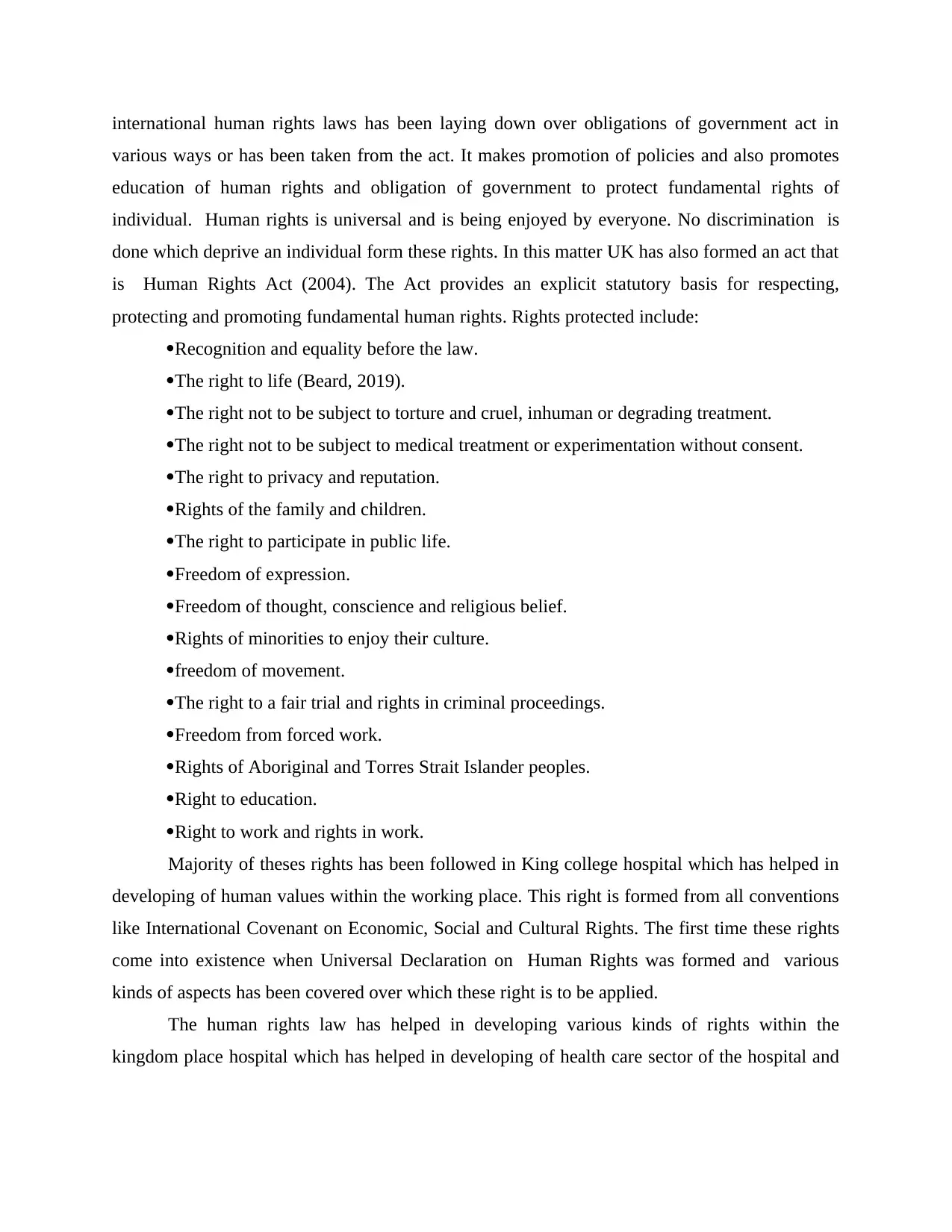
international human rights laws has been laying down over obligations of government act in
various ways or has been taken from the act. It makes promotion of policies and also promotes
education of human rights and obligation of government to protect fundamental rights of
individual. Human rights is universal and is being enjoyed by everyone. No discrimination is
done which deprive an individual form these rights. In this matter UK has also formed an act that
is Human Rights Act (2004). The Act provides an explicit statutory basis for respecting,
protecting and promoting fundamental human rights. Rights protected include:
Recognition and equality before the law.
The right to life (Beard, 2019).
The right not to be subject to torture and cruel, inhuman or degrading treatment.
The right not to be subject to medical treatment or experimentation without consent.
The right to privacy and reputation.
Rights of the family and children.
The right to participate in public life.
Freedom of expression.
Freedom of thought, conscience and religious belief.
Rights of minorities to enjoy their culture.
freedom of movement.
The right to a fair trial and rights in criminal proceedings.
Freedom from forced work.
Rights of Aboriginal and Torres Strait Islander peoples.
Right to education.
Right to work and rights in work.
Majority of theses rights has been followed in King college hospital which has helped in
developing of human values within the working place. This right is formed from all conventions
like International Covenant on Economic, Social and Cultural Rights. The first time these rights
come into existence when Universal Declaration on Human Rights was formed and various
kinds of aspects has been covered over which these right is to be applied.
The human rights law has helped in developing various kinds of rights within the
kingdom place hospital which has helped in developing of health care sector of the hospital and
various ways or has been taken from the act. It makes promotion of policies and also promotes
education of human rights and obligation of government to protect fundamental rights of
individual. Human rights is universal and is being enjoyed by everyone. No discrimination is
done which deprive an individual form these rights. In this matter UK has also formed an act that
is Human Rights Act (2004). The Act provides an explicit statutory basis for respecting,
protecting and promoting fundamental human rights. Rights protected include:
Recognition and equality before the law.
The right to life (Beard, 2019).
The right not to be subject to torture and cruel, inhuman or degrading treatment.
The right not to be subject to medical treatment or experimentation without consent.
The right to privacy and reputation.
Rights of the family and children.
The right to participate in public life.
Freedom of expression.
Freedom of thought, conscience and religious belief.
Rights of minorities to enjoy their culture.
freedom of movement.
The right to a fair trial and rights in criminal proceedings.
Freedom from forced work.
Rights of Aboriginal and Torres Strait Islander peoples.
Right to education.
Right to work and rights in work.
Majority of theses rights has been followed in King college hospital which has helped in
developing of human values within the working place. This right is formed from all conventions
like International Covenant on Economic, Social and Cultural Rights. The first time these rights
come into existence when Universal Declaration on Human Rights was formed and various
kinds of aspects has been covered over which these right is to be applied.
The human rights law has helped in developing various kinds of rights within the
kingdom place hospital which has helped in developing of health care sector of the hospital and
⊘ This is a preview!⊘
Do you want full access?
Subscribe today to unlock all pages.

Trusted by 1+ million students worldwide
1 out of 19
Related Documents
Your All-in-One AI-Powered Toolkit for Academic Success.
+13062052269
info@desklib.com
Available 24*7 on WhatsApp / Email
![[object Object]](/_next/static/media/star-bottom.7253800d.svg)
Unlock your academic potential
Copyright © 2020–2026 A2Z Services. All Rights Reserved. Developed and managed by ZUCOL.





